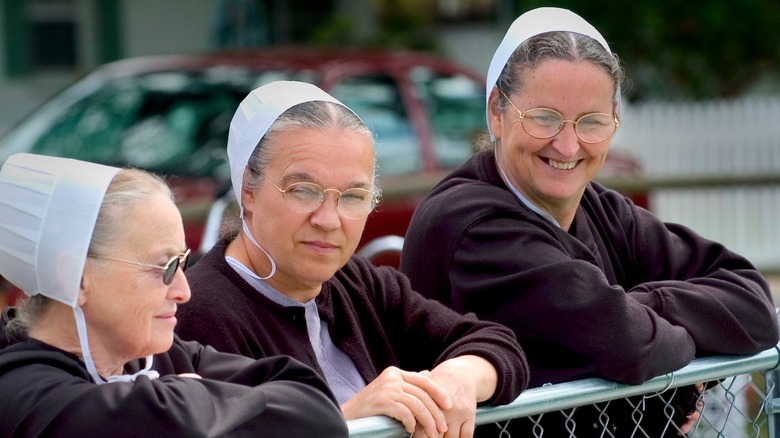The Real Reason Amish Women Don't Cut Their Hair
At the very least, people know three things about the Amish: 1) They're super religious, 2) There's a lot in Pennsylvania, and 3) As Weird Al said in 1996's "Amish Paradise," they "shun fancy things like electricity." That kinda-sorta covers the ultra-basics, but there's a lot more left to learn. For example, there's a lot more Amish than folks might realize. As of 2022, World Population Review reported there were nearly 368,000 Amish in the United States and more in places like Canada, Bolivia, and even Argentina. Plus, there are different types of Amish, like Old Order and New Order. According to PBS, Old Order alone has about 40 different subgroups scattered across over 1,900 congregations.
This means that "Amish" is more of a broad category than anything. They also share Anabaptist Christian roots with another 16th-century group, the Mennonites. But no matter the subgroup, all Amish share fundamental principles like piety and remaining removed from the rest of society (barring some sweet, sweet woodworking businesses). Amish people of all stripes take their rules very seriously, no matter how comparatively relaxed a community might be. Rule-breakers can be subjected to shunning, which involves getting cut off from the rest of the community.
As far as women are concerned, you can bet there's lots of rules to follow. They center on modesty of the biblical variety. Specifically, women's hair is considered sacred and shouldn't be cut. It's a gift from God that demands respect and protection.
Women's hair is a sacred gift from God
The Amish outlook on women's hair comes from 1 Corinthians 11 in the Bible's New Testament. It's worth quoting in full to help non-Amish understand: "Judge for yourselves: Is it proper for a woman to pray to God with her head uncovered? Does not the very nature of things teach you that if a man has long hair, it is a disgrace to him, but that if a woman has long hair, it is her glory? For long hair is given to her as a covering."
Those words come from one of Christianity's most important early leaders, Paul, an extremely well-educated Jewish rabbi. And that's the key point: Early Christianity grew out from a Jewish framework, and Judaism has always espoused protective views regarding women's hair. Namely, it's a marker of beauty and guarding it a way to maintain modesty.
As Chabad.org explains, Jewish tradition encourages women to cover their head to be presentable in public so that "beauty and attractiveness ... be saved for where it belongs — within marriage." The University of North Carolina says that women's hair is considered "ervah," or "erotic stimulus," and should stay shielded from prying eyes. While this doesn't necessarily mean not cutting hair — in fact, some Orthodox Jewish women shave their heads — the general principle of treating one's hair with care and respect holds. This principle made its way from the New Testament to religiously traditional groups like the Amish.
Hair should be neat and/or covered
So if Amish women shouldn't cut their hair, what can they do with it? Those with long hair will attest to how difficult it can be to manage, wash, dry, set, etc., no matter how pretty. Women tie up their often-waist long hair — maybe pleat it, put it in a bun, and keep it under a covering like a bonnet. Keeping it neat and orderly is critical, a way of demonstrating respect, and an important component of modesty. Styling one's hair would violate this basic tenet and also be a waste of time when faced with the tasks of everyday life. This also means no dryers, curlers, straighteners, or dyes. It does not, however, mean no washing, brushing, and caring for one's hair in private.
Because the Bible doesn't talk about modern devices like hair dryers, rules beyond common sense adherence to biblical principles fall under the purview of the Ordnung, which dates back to 16th-century Germany. The Ordnung is a set of written and unwritten rules by which Amish abide, and the term comes from the German word for "ordinances" or "disciplines," per Indiana Law Journal. It covers not only guidelines for women and their hair but also for men and their hair/beards, courtship and marriage, dealing with non-Amish, what's allowed during free time, orders for work, and more. And yes, as we mentioned before, violation of these rules, including those related to women's hair, could result in being shunned.


